''This will give it a chance to reorganise, and get everything in order: the zoning, environmental issues and also restore its natural resources and the environment,'' Khun Bhuritt said.
He is joking of course, but there is truth and virtue in what he says. If somehow everybody agreed to pack up and not return until 2015, then many of Phuket's problems might have an opportunity of being resolved.
''Phuket needs to stop, put its load down and rest for a little while to see what it can and cannot do,'' Khun Bhuritt adds.
The PTA is a privately funded organisation that meets monthly and is made up of over 350 members (hotels, restaurants etc) responsible for marketing and making connections within the tourism industry to better benefit Phuket's tourist industry.
It carries out extensive PR that includes putting on numerous exhibitions and tradeshows all around the world to promote Phuket as a marketable destination.
The PTA is funded by the members, with joining fees and maintenance costs, but it also receives 14-16 million baht from the Phuket Provincial Administration Orgnisation a year. This money, however, comes from the Hotel Tax coffer.
Khun Bhurrit said: ''Every hotel in Phuket should pay this tax, but of course many don't. All of the hotels in PTA certainly do, though.''
Because of this governmental support, the PTA must comply with certain Corporate Social Responsibility regulations. In November for example, the PTA donated one million baht to the flood victims of Bangkok.
''We're also involved with the Orborjor [the other name for the PPAO] in that we tend to draw up plans and projects of what we are going to do for the Orborjor to approve or not. Most of the times it is.
''We're also subject to lots of internal inspections and audits,'' added Khun Bhurrit.
Other duties of the PTA involve working with the Tourism Authority of Thailand to promote coming events. The alliance, he says, is functional but not ideal.
''It's easier to do it all ourselves. Phuket is just a minor concern of Thailand, but obviously the main one of PTA. But we do joint ventures and promotions once in a while, like for example the recently-held Andaman Tour Trade Fair on November 24-26.''
As well as meetings with its members and interested politicians, the PTA also listens to tourists' complaints and requests.
''Sometimes we get requests from tourists who wish, for example, to make Phuket a more family-friendly environment and to have more family-related activities here.''
The PTA also receives its fair share of complaints from tourists. These tend to be of the usual subject matter of tuk-tuk drivers and jet-ski operators.
These letters of complaints are often echoed by hotel owners who also write to the PTA to complain of problems with garbage, pollution, taxi fares and touts' aggressive nature.
Hotels also complain of the amount of red tape and the lengthy application process it takes to get things approved on the island.
This, according to Khunn Bhurrit, is one of the main causes, excuses and explanations, of the inability, hesitancy and reluctance to solve many of Phuket's problems.
''Trying to get planning permission is never straightforward in Phuket. An applicant has to receive confirmation from often different and opposing authorities.
''With a road sign for example, if the Orbortor says yes, but the Road Department says no, they still can go ahead and put one up. However if the Road Department says yes and the Orbortor says no, the Orbortor can rule over the Road Department.''
Khunn Bhurritt believes that the confusing hierarchical structure of the Thai government has its drawbacks.
''Each section has their own law and everybody is trying to make their own division of power dominant with nobody willing to bow down. In Thailand there are 35 ministries, each with their own law.''
A casualty of this confusing composition of government is the situation involving tuk-tuk and taxi companies and the seemingly all-encompassing monopoly that they have on public transport on the island.
It has been reported that the Kata-Karon Taxi Association has approved just 26 tour companies to pick up guests from hotels and resorts.
If a tour company is not on the list, then a driver - even a resident picking up a friend - may be refused entry at a makeshift taxi checkpoint, which is what happened at the Naithonburi Beach Resort in November.
Or worse still face physical punishment as meted out to the driver of a Koh Chang Safari car when he attempted to pick up guests from a resort in Kamala. These list of rules and possible punishments are not, of course, in the agreement.
This is partly because, according to Khun Bhurrit, there is no such agreement.
''This is nonsense, there is no law or agreement to this end. In fact,'' said Khun Bhurrit, ''There is a law to prevent anybody from enforcing this fake law or agreement. Laws to be upheld by the police, the local authority, and the Road Department. They all have laws to prevent this.
''The police, for example, could enforce a law to prevent them from illegally stopping people or holding people at these illegal checkpoints.
''The Transport Department could also arrest the taxi drivers because many of them are operating illegally. So why not arrest them for operating?''
Khun Bhuritt believes that the problem is not a lack of an applicable law, but a lack of anybody willing to enforce it.
''They {different departments} just close their eyes. They say 'Hey it's not just my responsibility, so why we have to do it?'' The PTA has long suggested that the taxis and tuk-tuks need a proper authority and organisation, authorised by the government along with standard low fares, and good public transport as an alternative. Nothing happens.''
At this point in the conversation, Khun Bhuritt recommends closing Phuket down for an extended break. This, he says, is essential if Phuket wants to be seriously considered a world-class destination.
At present he believes Phuket does not have world-class facilities, and therefore Phuket has no business marketing itself as such.
''There are many problems and issues we need to address. We have to provide better infrastructure to reach tourists' requirements: transport, maps, IT and address environmental issues. At the moment we cannot even compete with Bali.''
Addressing the issue of whether he saw the influx of lower-spending tourists of Russia, India and China as a negative, he shrugged his shoulders and said: ''The aim is always to be a tourist destination for tourists.
''You can only really control who comes in when you do something like they do in Monaco where they actually limit numbers to just 8000 visitors a year, then they can guarantee the infrastructure and amenities will not be stretched.''
Khun Bhurtit made the argument that if Patong had just 50 hotels, then few would argue that it would look and operate much better, but said that this was just not feasible.
''This just can't happen, because people want and need to make a living and some are just greedy. If it's popular, people will come and more people will want to benefit from it. As a result the high-end traveller will stop coming. Sure, we cannot stop this.''
It is not that Khun Bhurrit thinks that it can't be done, just that it will be incredibly difficult.
''The PTA has suggested limiting the number of hotel rooms and obviously doing something about the taxi problem.''
''It's funny,'' said Khun Bhurrit, without a trace of a smile, ''They (tuk tuk and taxi drivers) argue that if they weren't to do it, they wouldn't have jobs, but that's not true. I myself could employ 50-60 people here (Patong Resort Hotel) today, but they are just not willing to be workers, they all want to be bosses.''
So, what to do? We suggest a complete revision and purge of corruption through systematic socialisation like was done in Singapore but, hun Bhurrit just shakes his head. Phuket and Singapore apparently are much different beasts.
''Singapore has a distinct plan every 10 years. In the 80s they realised that the country needed money in order to build, so it was successfully marketed as a great shopping destination.
''In the 90s it was marketed as a place for international students to come and receive a high quality of education. In the last decade Singapore was marketed as an entertainment centre with casinos etc. It has a solid base, in which to grow, and it has plans.
''This is why Phuket needs to shut down,'' said Khun Bhurrit, ''To take stock, slow down and actually plan what to do.''

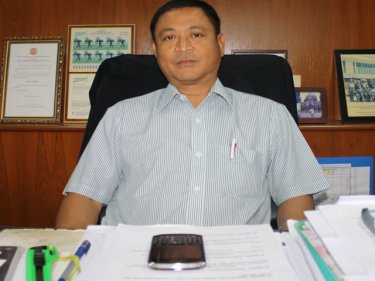
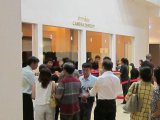

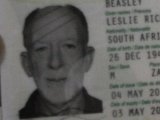
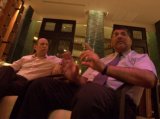
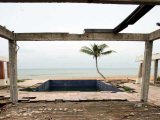
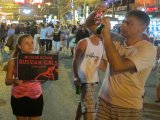



So true sir, Phuket is a big mess.
Posted by Jean-Paul Patrick on December 25, 2011 08:52